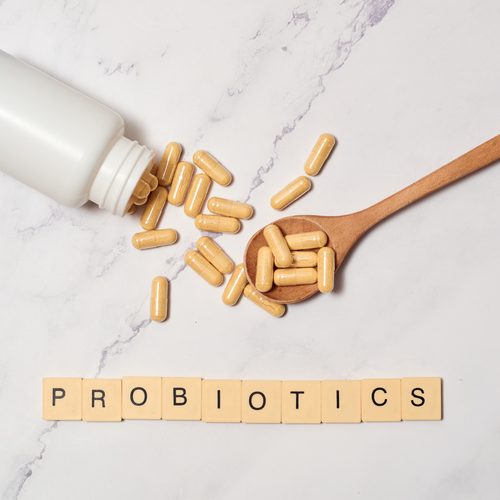What to remember:
Immunity is divided into two types: innate (rapid) and adaptive (specific).
A balanced diet strengthens the immune system.
Moderate physical exercise supports an effective immune response.
Tobacco, alcohol and stress weaken natural defenses.
Quality sleep improves cytokine production and immune efficiency.
What is immunity?
Immunity is the body's ability to defend itself against pathogens (viruses, bacteria, fungi, parasites) and other foreign substances. It is based on two main types of defense:
-
Innate (or natural) immunity: First line of defense, rapid but non-specific (e.g. skin, mucous membranes, macrophages).
-
Adaptive (or acquired) immunity: Slower but specific, it remembers pathogens for a faster response during a future infection (e.g.: antibodies, B and T lymphocytes).
Strengthen your immune system naturally through diet
Strengthening your immune system is ultimately a daily task, and the quality of our immunity depends primarily on our diet. By optimizing the quality of our diet, we can therefore strengthen our immunity naturally.
On the one hand, by providing the immune system with the nutrients it needs to function properly, and on the other hand, by taking care of its intestinal microbiota since it plays a major role in our immunity. Indeed, our intestinal microbiota constitutes a physical immune barrier that prevents pathogens from settling and possibly penetrating the intestinal barrier to reach the bloodstream. In addition, when well nourished, it synthesizes metabolites such as IgA (= immunoglobulin A = type of antibody), anti-microbial peptides (= molecules preventing the proliferation of pathogenic microorganisms) and is partly responsible for the production of protective mucus for intestinal cells. This is why nourishing your microbiota well contributes to the good health of your immune system.
#1 - Increase your consumption of foods rich in prebiotics
Prebiotics include dietary fiber (found in fruits, vegetables, legumes, whole grains, seeds, and oilseeds), resistant starch (obtained by refrigerating starchy foods for at least 6 hours, also found in green or unripe bananas), polyphenols (which give food color), and fructans (found in leeks, beets, Jerusalem artichokes, artichokes, and bananas). They serve as fuel for our own intestinal bacteria called probiotics and enable their growth, thus promoting the development of the immune system.
#2 - Increase your consumption of foods rich in probiotics
Foods rich in probiotics include, for example, lacto-fermented foods: yogurt, sauerkraut, pickles, gherkins, olives, fermented soybeans (tempeh, tofu or miso), and fermented drinks such as kefir and kombucha .
#3 - Stock up on omega-3, vitamins and minerals to strengthen your immune system
Omega-3s contribute to the integrity and maintenance of our intestinal mucosa. They also have inflammation-regulating properties, the latter being a necessary and natural response of the immune system.
Certain vitamins are well known for their role in immunity. These include vitamin D , vitamin C , and vitamin E, three vitamins that contribute to the normal functioning of the immune system. Vitamin D stimulates natural defenses while preventing excessive inflammation, vitamin C is recognized as a powerful antioxidant that supports various cellular functions of the immune system, and vitamin E protects cells from oxidative stress. Among the minerals, zinc is the most important: it is essential for the production and activation of white blood cells, the activity of NK (natural killer) cells, and the anti-inflammatory response.
#4 - Don't skip macronutrients: proteins, lipids and carbohydrates
Macronutrients provide energy, unlike micronutrients and fiber. This energy is essential for vital body functions, such as breathing, blood circulation through the heartbeat, digestion, and the proper functioning of the kidneys and liver. In addition, there is the energy expenditure associated with daily activities. The energy provided by food is therefore largely mobilized for these needs. However, when the immune system is stressed, it requires additional energy to function effectively. This is why carbohydrates play a key role: they are the main source of energy for cells, including those of the immune system. Also, lipids are essential for effective immunity by providing energy, regulating inflammation, and ensuring the structure of immune cells. A balance between omega-3 and omega-6 is crucial to avoid an excessive inflammatory response and promote an optimal immune response.
Finally, proteins play a crucial role in structuring our cells and constituting 100% of the antibodies, enzymes, and cytokines essential for immunity. Antibodies help neutralize pathogens, while certain immune enzymes, such as proteases, contribute to their elimination. Cytokines, for their part, regulate communication between immune cells and orchestrate the body's defense response. In addition, proteins provide amino acids that nourish intestinal cells and help maintain the intestinal barrier, a key element of immunity.
As you can see, it's essential to include these three major components in your diet. Without sufficient intake, the body risks lacking the elements necessary for effective immunity.
#5 - Limit processed foods
Often rich in refined sugars, food additives and poor quality fats, they directly disrupt our intestinal wall and our microbiota, thus creating inflammation and intestinal dysbiosis , the source of many dysfunctions in our health.
Boost your immunity naturally through healthy living
Our modern lifestyle, often sedentary and associated with an unbalanced diet, can weaken immunity and increase the risk of chronic diseases. This is why, beyond diet, supporting immunity also involves lifestyle habits.
#1 - The importance of physical activity: a driver of immunity
Moderate, regular exercise benefits the immune system, reducing the risk of chronic infections and inflammation. For lasting benefits, it is recommended to engage in at least 2.5 hours of moderate exercise per week, spread over several sessions. This regularity promotes a more effective immune response and better overall health.
Excessive or intense physical activity without adequate recovery can, on the contrary, weaken immunity.
#2 - Tobacco: the silent enemy of your defenses
Smoking weakens the immune system, increasing vulnerability to infections and diseases. Studies have shown that even after smoking cessation, some immune system impairments persist for many years. This immune system weakness can increase the risk of autoimmune diseases and reduce the effectiveness of immune responses to infections.
It is therefore essential to consider stopping smoking to preserve and strengthen the body's natural defenses.
#3 - Alcohol and immunity: when moderation becomes an ally
Excessive alcohol consumption weakens the immune system by disrupting immune cell function, increasing the risk of infections. Alcohol inhibits cytokine production and impairs the intestinal barrier, which plays a key role in the body's defenses and nutrient absorption, leading to intestinal inflammation and nutritional deficiencies.
#4 - Restful sleep: the key to a strong immune system
Sleep plays a key role in the proper functioning of the immune system. According to a study by Inserm, sleep deprivation disrupts cytokine production. A lack of sleep increases vulnerability to disease and can slow the immune response. However, adequate quality sleep helps strengthen the body's defenses. Researchers also point out that regular sleep cycles help maintain the balance of immune cells and improve their effectiveness. Good sleep is therefore not just a matter of recovery, but actively contributes to robust immunity.
#5 - Stress and immunity: taming your emotions to better defend yourself
Chronic stress weakens the immune system by altering the production of certain immune cells and disrupting the production of cytokines. This can lead to a reduced immune system effectiveness and increase susceptibility to disease. Stress management, through techniques such as meditation, yoga, or relaxation, can help restore an optimal immune response.
Conclusion
Maintaining a strong immune system requires a balanced lifestyle. A nutrient-rich diet, restful sleep, regular exercise, and stress management all play a key role in strengthening our natural defenses. Conversely, behaviors such as excessive alcohol and tobacco consumption weaken our immune capabilities. By taking care of these aspects, we can maintain robust immunity and reduce the risk of infections and diseases.
Sources :
[1] Lee, GY, & Han, SN (2018). The Role of Vitamin E in Immunity. Nutrients, 10(11), 1614. https://doi.org/10.3390/nu10111614
[2] Al Mahmud, A., Shafayet Ahmed Siddiqui, Karim, MR, Al-Mamun, MR, Akhter, S., Sohel, M., Hasan, M., Bellah, SF, & Amin, MN (2023). Clinically proven natural products, vitamins and minerals in boosting up immunity: A comprehensive review. Heliyon, 9(4), e15292. https://doi.org/10.1016/j.heliyon.2023.e15292
[3] Shao, T., Verma, H.K., Pande, B., Costanzo, V., Ye, W., Cai, Y., & Bhaskar, LVKS (2021). Physical Activity and Nutritional Influence on Immune Function: An Important Strategy to Improve Immunity and Health Status. Frontiers in physiology, 12, 751374. https://doi.org/10.3389/fphys.2021.751374
[4] Sorbonne University, 01/17/2024, Sport in the service of our immunity, consulted from: https://www.sorbonne-universite.fr/actualites/le-sport-au-service-de-notre-immunite?utm_source=chatgpt.com
[5] Saint-André, V., Charbit, B., Biton, A. et al. Smoking changes adaptive immunity with persistent effects. Nature 626, 827–835 (2024). https://doi.org/10.1038/s41586-023-06968-8
[6] Berticat, C., Thomas, F., Dauvilliers, Y. et al. Excessive daytime sleepiness and antipathogen drug consumption in the elderly: a test of the immune theory of sleep. Sci Rep 6, 23574 (2016). https://doi.org/10.1038/srep23574













